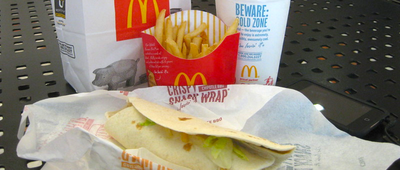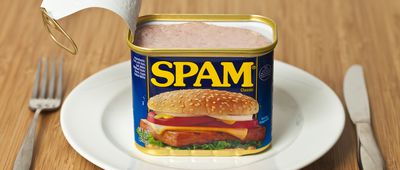This Dangerous TikTok Trend Is Sending Kids to the Hospital
TikTok has a reputation for spawning some of the strangest — and most dangerous — trends of the past few years. In the “penny challenge,” TikTokkers would stick a coin behind a plugged-in phone charger. And then there was “sleepy chicken,” which had people marinating their poultry in NyQuil. The latest dangerous internet craze? The “one chip challenge.”
The challenge involves eating a single chip seasoned with Carolina reaper and scorpion peppers — aka two of the hottest peppers in the world. Participants are then supposed to wait as long as possible before drinking or eating anything.
The company behind the tongue-melting chip, Paqui, debuted the challenge in 2016, marketing the masochistic snack in a coffin-shaped box. The company’s 2022 iteration, sold for $9 plus shipping, “now turns your tongue blue as a badge of honor to prove you completed the challenge!”
A feature on the popular YouTube show “Hot Ones" featuring Tony Hawk appears to have repopularized the years-old trend, which has also found its way to TikTok, a Gen Z-dominated platform. And it’s making kids sick.
In Edina, Minnesota, local news outlet KNOE reports that “several students” at South View Middle School “reported eye pain and difficulty breathing” after trying the challenge in October. While no one was seriously hurt, an ambulance was called.
And in an unverified TikTok video, a young adult is shown clutching their stomach in the emergency room after attempting Paqui’s challenge. Since its upload in September, the video has accumulated over 17 million views, serving as a warning to other TikTokkers.
One commenter wrote that their kids “literally just tried to get me to buy them (the chip) from the gas station” before she saw the video. Other viewers shared their own experiences with the uncomfortably spicy snack.
A TikTokker wrote that she almost went to the emergency room after experiencing the worst stomach pain they’ve “ever had,” accompanied by vomiting and diarrhea.
Gallery: These Viral TikTok Trends Cleared Store Shelves
Alongside marketing materials that encourage fans to try the challenge, Paqui has posted a warning on its website.
“Do not eat if you are sensitive to spicy foods, allergic to peppers, nightshades or capsaicin, or are pregnant or have any medical conditions. Keep out of reach of children,” the warning reads. The company’s website also says to “seek medical assistance” if you faint, have trouble breathing, or experience extended nausea.
@cheekyboyos Replying to @spicymamabears Comment what we should do next 😬 #spicy ♬ original sound - the cheeky boyos
Poison Control has dedicated an entire page to the “one chip challenge,” warning that capsaicin, the active ingredient in spicy peppers, can be harmful. Beyond “mouth irritation” and “intestinal discomfort,” consuming capsaicin can “also cause repeated vomiting that can lead to life-threatening esophageal damage,” the website reads.
Some schools have moved to ban the chip to protect students, noting that students have been hospitalized after attempting the challenge.
In a press release sent to Today, Jennifer Hines, the chief communications officer for Tyler Independent School District in Tyler, Texas, wrote that they sent a student to the hospital in 2021.
“Parents, please speak with your children about the seriousness of what could happen when they try to do these social media challenges. We love your children and want them to be safe and healthy,” she added.
In a statement released to Cheapism, the Paqui team said that they take "safety very seriously" and have made an effort to properly label their products.
"Our One Chip Challenge packaging states that it should not be ingested by individuals who are sensitive to spicy foods, allergic to peppers, nightshades, or capsaicin, or who are pregnant or have any medical conditions. Our packaging also warns to keep the product out of the reach of children," the statement reads.
If you’ve attempted the challenge and are seeking help, you can contact Poison Control at 1-800-222-1222, or online at webPOISONCONTROL. Assistance is free, confidential, and available 24/7.
For more stories like this, please sign up for our free newsletters.








